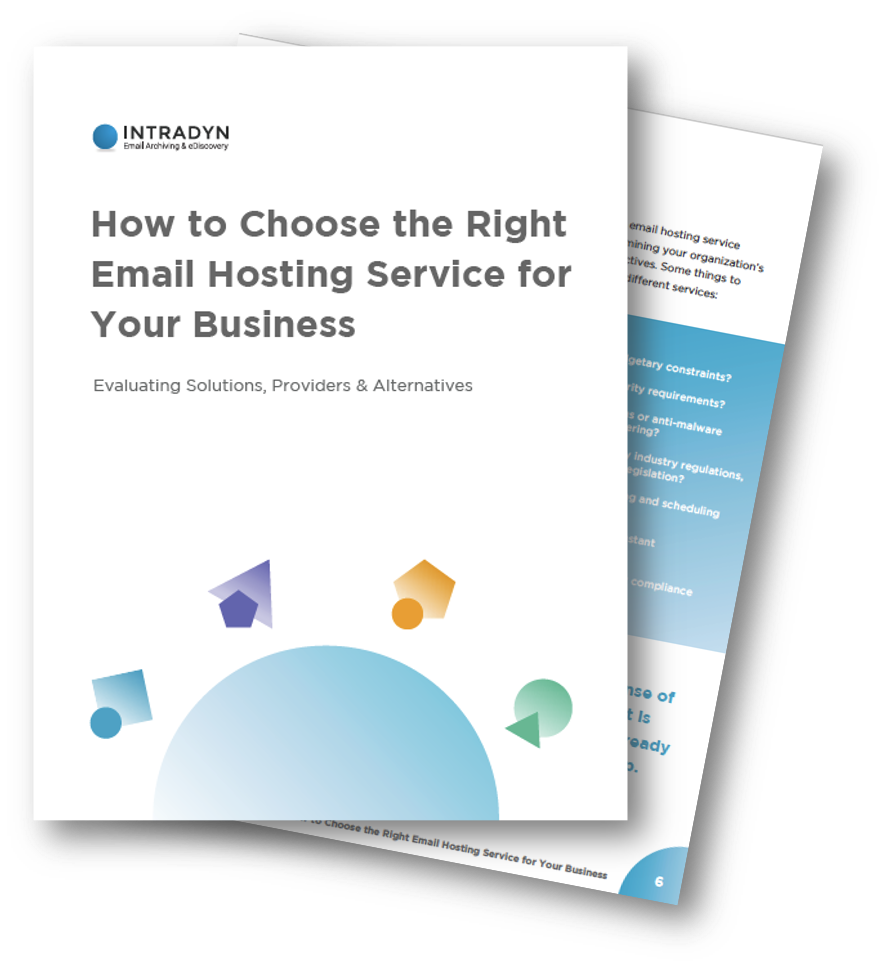6 Contenders for Best Microsoft Exchange Alternative

Nearly everyone who has a basic familiarity with email has at least heard of Exchange, Microsoft’s email server solution, if not used it themselves. Microsoft has become a household name for its innovative software solutions, and Exchange is no exception: It earns high marks from users for its versatility, flexibility, customizability and ease of use, effectively making it the gold standard for on-premises email servers.
That said, Exchange isn’t without its drawbacks. As an on-prem email server, it requires a significant amount of storage space and computing resources, which could present a challenge for small and medium-sized businesses (SMBs). Also challenging for SMBs? Exchange’s price tag. In addition to the initial licensing cost, businesses using Microsoft Exchange Server must also foot the bill for routine hardware maintenance, as well as any necessary repairs should the system go down. Although Microsoft offers a cloud-based version of Exchange with Exchange Online, prospective buyers are better off investing in the full Office 365 Business Premium package in order to access the full range of Microsoft services.
Are you in the market for an Exchange alternative? Check out our list of top contenders as you begin your search.
Shop Exchange Alternatives
Shop Microsoft Exchange Alternative
Google G Suite
Any list of Exchange alternatives would be incomplete without G Suite, Google’s collaboration and productivity software suite. Although its vast array of applications makes it a more fitting analogue for Office 365 than Exchange alone, Gmail — a cloud-based email server included in G Suite — is a leading competitor for both Exchange Server and Exchange Online. For the starting price of $6 per user, per month, users get access to Gmail for business email, 30GB of cloud storage and shared calendars, as well as Google’s full suite of productivity applications.
| Pros | Cons | Pricing |
|
|
|
Horde
Horde is a fully open source webmail client and “enterprise-ready, browser-based communication suite.” Although its functionality isn’t quite as advanced as that of Office 365 or G Suite, it does offer more productivity features than the traditional webmail client, as well as advanced access controls for more granular user permissions. At the exceptionally low cost of free, Horde Groupware Webmail Edition is a more than suitable Microsoft Exchange alternative for the price.
| Pros | Cons | Pricing |
|
|
Free |
IceWarp
Perhaps the biggest selling point of IceWarp — a self-proclaimed “fully-featured Exchange alternative” — is that it’s less than half the cost of Exchange Server. For that low cost, users get access to an impressive array of collaboration applications, including business-class email and calendaring, instant messaging functionality and document storage. IceWarp’s browser-based webmail client boasts everything from custom domains and multi-layered security to GDPR-compliant login settings and smart attachments, making it an exciting Exchange alternative.
| Pros | Cons | Pricing |
|
|
Server-hosted subscription and license plans available upon request. |
Kerio Connect
Recently acquired by GFI Software, Kerio Connect is a software suite featuring business email, instant messaging, calendar applications and more. Users have their choice of on-premises deployment or partner-hosted cloud environment and, according to the GFI website, Kerio Connect takes as little as 10 minutes to install and deploy. Kerio Connect offers many of the same collaboration tools as Exchange, including email integration with calendars and scheduling, contact and task management, notes and instant messaging. Prospective buyers interested in this Exchange alternative should note that Kerio Connect is priced according to the number of users within an organization; full pricing information can be found here.
| Pros | Cons | Pricing |
|
|
|
Open-Xchange App Suite
Open-Xchange’s (OX, for short) full application suite includes productivity tools, security solutions and, most important for those looking to make the switch from Microsoft Exchange, email and messaging capabilities. OX App Suite’s white-labeled email solution enables users to access their email both online and offline and from any device. Similar to other Exchange alternatives on this list, OX App Suite offers contact management, scheduling and task management capabilities, all of which integrate with its email functionality. OX App Suite also includes an easy-to-use personal dashboard, called OX Portal, that provides users with a high-level overview of all information contained within the suite.
| Pros | Cons | Pricing |
|
|
Pricing available upon request. |
Zimbra Collaboration
According to the folks over at Zimbra, Zimbra Collaboration “incorporates several open source projects under one supported and certified application to offer world-class, open source collaboration consumable for the enterprise.” At the heart of this is Zimbra’s email server, which integrates with the company’s messaging, calendaring and chat/video conferencing functionalities to create a centralized database for all business communications. Accessible from any device, Zimbra Collaboration provides a MAPI connector so users can port their mailbox to Outlook, as well as enhanced Allow/Block/Quarantine security controls for granular user permissions. Zimbra Collaboration users will also be happy to learn that they’ll also have access to other collaboration tools similar to those of Office 365, such as Zimbra Drive for file sync, sharing and storage and Zimbra Docs for document and presentation generation.
| Pros | Cons | Pricing |
|
|
Prices start at $25/user/mo. |

Choose Exchange Alternatives
Tips for Choosing an Exchange Alternative
So, you’ve studied up on Exchange alternatives — now it’s time to decide which one makes the most sense for your business. Before you choose, we’d like to take the opportunity to offer a little bit of advice on how to determine which option could be right for you:
- Consider the size of your organization. How many employees you currently have and whether you intend to expand in the near future will dictate the amount of storage and the type of service plan you require. This information is also important from a capacity planning and scalability perspective.
- Choose the right deployment option. Most email services offer on-premises or cloud deployment options; some even offer a virtual hardware option. Each option comes with its own set of advantages and disadvantages — for example, an on-premises email server could provide greater availability because, were your system to go down, you could immediately access the server to resolve the outage. On the other hand, since cloud-based email servers are completely managed by their providers, you would save on maintenance by investing in such a solution. Whether you intend to use the same deployment style or want to make a switch, carefully consider your options before deciding.
- Make sure it has the right features. Chat functionality, document generation and file sharing are all nice to have but when it comes to choosing an email provider, there are a few more basic features you’ll want to look for. Since security breaches are a fact of life, you’ll want to look for a provider with robust security features, such as encryption, two-factor authentication and end-to-end encryption. For greater flexibility, look for a provider that offers both IMAP and POP support, and whose client can integrate with major providers such as Outlook, Yahoo and Gmail. Other key features to look for include spam filters and custom domains.
- Make mobile usage a priority. Although in this day and age you’d hard-pressed to find an email service that doesn’t offer mobile functionality, it’s still worth checking. The fact of the matter is that business is no longer restricted to the workplace, so your employees need the peace of mind of knowing that they can easily access their emails while on the go.
- Access the latest innovations. In order to ensure that your organization gets access to the latest and greatest features, look for a provider with a consistent update/upgrade schedule, as well as a painless update/upgrade process that requires minimal reconfiguration.
- Don’t underestimate the value of support. Hopefully, if you choose the right email server, you’ll use it for years to come. At some point, over the course of those years, something will inevitably go wrong, whether that’s a system outage or issues sending and receiving emails. None of this should be cause for concern if you have the right support team to help you troubleshoot. Look specifically for providers that offer 24/7 support, preferably via phone, text and email, to really get your money’s worth.
- Read reviews. Existing users of any email service are an invaluable source of objective feedback, so be sure to read as many reviews as possible — we really can’t stress this enough.
As a closing piece of advice, we also recommend that you invest in an email archiving solution to accompany your new email server. From enhanced storage and knowledge management to superior mail server performance, an email archiver builds upon the foundation laid by your email server by providing a secure way to store valuable business communications. Learn more about the benefits of email archiving and how it can enhance your email service by talking to one of the specialists at Intradyn today.

